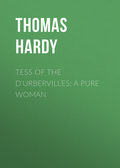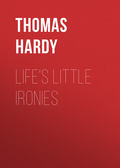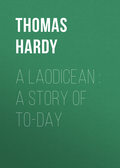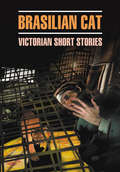полная версия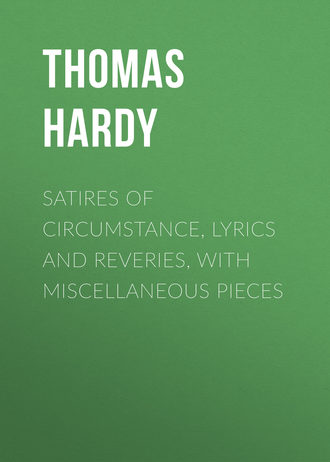

Томас Харди (Гарди)
Satires of Circumstance, Lyrics and Reveries, with Miscellaneous Pieces
IN DEATH DIVIDED
I
I shall rot here, with those whom in their day
You never knew,
And alien ones who, ere they chilled to clay,
Met not my view,
Will in your distant grave-place ever neighbour you.
II
No shade of pinnacle or tree or tower,
While earth endures,
Will fall on my mound and within the hour
Steal on to yours;
One robin never haunt our two green covertures.
III
Some organ may resound on Sunday noons
By where you lie,
Some other thrill the panes with other tunes
Where moulder I;
No selfsame chords compose our common lullaby.
IV
The simply-cut memorial at my head
Perhaps may take
A Gothic form, and that above your bed
Be Greek in make;
No linking symbol show thereon for our tale’s sake.
V
And in the monotonous moils of strained, hard-run
Humanity,
The eternal tie which binds us twain in one
No eye will see
Stretching across the miles that sever you from me.
THE PLACE ON THE MAP
I
I look upon the map that hangs by me —
Its shires and towns and rivers lined in varnished artistry —
And I mark a jutting height
Coloured purple, with a margin of blue sea.
II
– ’Twas a day of latter summer, hot and dry;
Ay, even the waves seemed drying as we walked on, she and I,
By this spot where, calmly quite,
She informed me what would happen by and by.
III
This hanging map depicts the coast and place,
And resuscitates therewith our unexpected troublous case
All distinctly to my sight,
And her tension, and the aspect of her face.
IV
Weeks and weeks we had loved beneath that blazing blue,
Which had lost the art of raining, as her eyes to-day had too,
While she told what, as by sleight,
Shot our firmament with rays of ruddy hue.
V
For the wonder and the wormwood of the whole
Was that what in realms of reason would have joyed our double soul
Wore a torrid tragic light
Under order-keeping’s rigorous control.
VI
So, the map revives her words, the spot, the time,
And the thing we found we had to face before the next year’s prime;
The charted coast stares bright,
And its episode comes back in pantomime.
WHERE THE PICNIC WAS
Where we made the fire,
In the summer time,
Of branch and briar
On the hill to the sea
I slowly climb
Through winter mire,
And scan and trace
The forsaken place
Quite readily.
Now a cold wind blows,
And the grass is gray,
But the spot still shows
As a burnt circle – aye,
And stick-ends, charred,
Still strew the sward
Whereon I stand,
Last relic of the band
Who came that day!
Yes, I am here
Just as last year,
And the sea breathes brine
From its strange straight line
Up hither, the same
As when we four came.
– But two have wandered far
From this grassy rise
Into urban roar
Where no picnics are,
And one – has shut her eyes
For evermore.
THE SCHRECKHORN
(With thoughts of Leslie Stephen)
(June 1897)
Aloof, as if a thing of mood and whim;
Now that its spare and desolate figure gleams
Upon my nearing vision, less it seems
A looming Alp-height than a guise of him
Who scaled its horn with ventured life and limb,
Drawn on by vague imaginings, maybe,
Of semblance to his personality
In its quaint glooms, keen lights, and rugged trim.
At his last change, when Life’s dull coils unwind,
Will he, in old love, hitherward escape,
And the eternal essence of his mind
Enter this silent adamantine shape,
And his low voicing haunt its slipping snows
When dawn that calls the climber dyes them rose?
A SINGER ASLEEP
(Algernon Charles Swinburne, 1837–1909)
I
In this fair niche above the unslumbering sea,
That sentrys up and down all night, all day,
From cove to promontory, from ness to bay,
The Fates have fitly bidden that he should be Pillowed eternally.
II
– It was as though a garland of red roses
Had fallen about the hood of some smug nun
When irresponsibly dropped as from the sun,
In fulth of numbers freaked with musical closes,
Upon Victoria’s formal middle time
His leaves of rhythm and rhyme.
III
O that far morning of a summer day
When, down a terraced street whose pavements lay
Glassing the sunshine into my bent eyes,
I walked and read with a quick glad surprise
New words, in classic guise, —
IV
The passionate pages of his earlier years,
Fraught with hot sighs, sad laughters, kisses, tears;
Fresh-fluted notes, yet from a minstrel who
Blew them not naïvely, but as one who knew
Full well why thus he blew.
V
I still can hear the brabble and the roar
At those thy tunes, O still one, now passed through
That fitful fire of tongues then entered new!
Their power is spent like spindrift on this shore;
Thine swells yet more and more.
VI
– His singing-mistress verily was no other
Than she the Lesbian, she the music-mother
Of all the tribe that feel in melodies;
Who leapt, love-anguished, from the Leucadian steep
Into the rambling world-encircling deep
Which hides her where none sees.
VII
And one can hold in thought that nightly here
His phantom may draw down to the water’s brim,
And hers come up to meet it, as a dim
Lone shine upon the heaving hydrosphere,
And mariners wonder as they traverse near,
Unknowing of her and him.
VIII
One dreams him sighing to her spectral form:
“O teacher, where lies hid thy burning line;
Where are those songs, O poetess divine
Whose very arts are love incarnadine?”
And her smile back: “Disciple true and warm,
Sufficient now are thine.”.
IX
So here, beneath the waking constellations,
Where the waves peal their everlasting strains,
And their dull subterrene reverberations
Shake him when storms make mountains of their plains —
Him once their peer in sad improvisations,
And deft as wind to cleave their frothy manes —
I leave him, while the daylight gleam declines
Upon the capes and chines.
Bonchurch, 1910.
A PLAINT TO MAN
When you slowly emerged from the den of Time,
And gained percipience as you grew,
And fleshed you fair out of shapeless slime,
Wherefore, O Man, did there come to you
The unhappy need of creating me —
A form like your own – for praying to?
My virtue, power, utility,
Within my maker must all abide,
Since none in myself can ever be,
One thin as a shape on a lantern-slide
Shown forth in the dark upon some dim sheet,
And by none but its showman vivified.
“Such a forced device,” you may say, “is meet
For easing a loaded heart at whiles:
Man needs to conceive of a mercy-seat
Somewhere above the gloomy aisles
Of this wailful world, or he could not bear
The irk no local hope beguiles.”
– But since I was framed in your first despair
The doing without me has had no play
In the minds of men when shadows scare;
And now that I dwindle day by day
Beneath the deicide eyes of seers
In a light that will not let me stay,
And to-morrow the whole of me disappears,
The truth should be told, and the fact be faced
That had best been faced in earlier years:
The fact of life with dependence placed
On the human heart’s resource alone,
In brotherhood bonded close and graced
With loving-kindness fully blown,
And visioned help unsought, unknown.
1909–10.
GOD’S FUNERAL
I
I saw a slowly-stepping train —
Lined on the brows, scoop-eyed and bent and hoar —
Following in files across a twilit plain
A strange and mystic form the foremost bore.
II
And by contagious throbs of thought
Or latent knowledge that within me lay
And had already stirred me, I was wrought
To consciousness of sorrow even as they.
III
The fore-borne shape, to my blurred eyes,
At first seemed man-like, and anon to change
To an amorphous cloud of marvellous size,
At times endowed with wings of glorious range.
IV
And this phantasmal variousness
Ever possessed it as they drew along:
Yet throughout all it symboled none the less
Potency vast and loving-kindness strong.
V
Almost before I knew I bent
Towards the moving columns without a word;
They, growing in bulk and numbers as they went,
Struck out sick thoughts that could be overheard: —
VI
“O man-projected Figure, of late
Imaged as we, thy knell who shall survive?
Whence came it we were tempted to create
One whom we can no longer keep alive?
VII
“Framing him jealous, fierce, at first,
We gave him justice as the ages rolled,
Will to bless those by circumstance accurst,
And longsuffering, and mercies manifold.
VIII
“And, tricked by our own early dream
And need of solace, we grew self-deceived,
Our making soon our maker did we deem,
And what we had imagined we believed.
IX
“Till, in Time’s stayless stealthy swing,
Uncompromising rude reality
Mangled the Monarch of our fashioning,
Who quavered, sank; and now has ceased to be.
X
“So, toward our myth’s oblivion,
Darkling, and languid-lipped, we creep and grope
Sadlier than those who wept in Babylon,
Whose Zion was a still abiding hope.
XI
“How sweet it was in years far hied
To start the wheels of day with trustful prayer,
To lie down liegely at the eventide
And feel a blest assurance he was there!
XII
“And who or what shall fill his place?
Whither will wanderers turn distracted eyes
For some fixed star to stimulate their pace
Towards the goal of their enterprise?”.
XIII
Some in the background then I saw,
Sweet women, youths, men, all incredulous,
Who chimed as one: “This figure is of straw,
This requiem mockery! Still he lives to us!”
XIV
I could not prop their faith: and yet
Many I had known: with all I sympathized;
And though struck speechless, I did not forget
That what was mourned for, I, too, once had prized.
XV
Still, how to bear such loss I deemed
The insistent question for each animate mind,
And gazing, to my growing sight there seemed
A pale yet positive gleam low down behind,
XVI
Whereof to lift the general night,
A certain few who stood aloof had said,
“See you upon the horizon that small light —
Swelling somewhat?” Each mourner shook his head.
XVII
And they composed a crowd of whom
Some were right good, and many nigh the best.
Thus dazed and puzzled ’twixt the gleam and gloom
Mechanically I followed with the rest.
1908–10.
SPECTRES THAT GRIEVE
“It is not death that harrows us,” they lipped,
“The soundless cell is in itself relief,
For life is an unfenced flower, benumbed and nipped
At unawares, and at its best but brief.”
The speakers, sundry phantoms of the gone,
Had risen like filmy flames of phosphor dye,
As if the palest of sheet lightnings shone
From the sward near me, as from a nether sky.
And much surprised was I that, spent and dead,
They should not, like the many, be at rest,
But stray as apparitions; hence I said,
“Why, having slipped life, hark you back distressed?
“We are among the few death sets not free,
The hurt, misrepresented names, who come
At each year’s brink, and cry to History
To do them justice, or go past them dumb.
“We are stript of rights; our shames lie unredressed,
Our deeds in full anatomy are not shown,
Our words in morsels merely are expressed
On the scriptured page, our motives blurred, unknown.”
Then all these shaken slighted visitants sped
Into the vague, and left me musing there
On fames that well might instance what they had said,
Until the New-Year’s dawn strode up the air.
“AH, ARE YOU DIGGING ON MY GRAVE?”
“Ah, are you digging on my grave
My loved one? – planting rue?”
– “No: yesterday he went to wed
One of the brightest wealth has bred.
‘It cannot hurt her now,’ he said,
‘That I should not be true.’”
“Then who is digging on my grave?
My nearest dearest kin?”
– “Ah, no; they sit and think, ‘What use!
What good will planting flowers produce?
No tendance of her mound can loose
Her spirit from Death’s gin.’”
“But some one digs upon my grave?
My enemy? – prodding sly?”
– “Nay: when she heard you had passed the Gate
That shuts on all flesh soon or late,
She thought you no more worth her hate,
And cares not where you lie.”
“Then, who is digging on my grave?
Say – since I have not guessed!”
– “O it is I, my mistress dear,
Your little dog, who still lives near,
And much I hope my movements here
Have not disturbed your rest?”
“Ah, yes! You dig upon my grave.
Why flashed it not on me
That one true heart was left behind!
What feeling do we ever find
To equal among human kind
A dog’s fidelity!”
“Mistress, I dug upon your grave
To bury a bone, in case
I should be hungry near this spot
When passing on my daily trot.
I am sorry, but I quite forgot
It was your resting-place.”
SATIRES OF CIRCUMSTANCES IN FIFTEEN GLIMPSES
I
AT TEA
The kettle descants in a cozy drone,
And the young wife looks in her husband’s face,
And then at her guest’s, and shows in her own
Her sense that she fills an envied place;
And the visiting lady is all abloom,
And says there was never so sweet a room.
And the happy young housewife does not know
That the woman beside her was first his choice,
Till the fates ordained it could not be so.
Betraying nothing in look or voice
The guest sits smiling and sips her tea,
And he throws her a stray glance yearningly.
II
IN CHURCH
“And now to God the Father,” he ends,
And his voice thrills up to the topmost tiles:
Each listener chokes as he bows and bends,
And emotion pervades the crowded aisles.
Then the preacher glides to the vestry-door,
And shuts it, and thinks he is seen no more.
The door swings softly ajar meanwhile,
And a pupil of his in the Bible class,
Who adores him as one without gloss or guile,
Sees her idol stand with a satisfied smile
And re-enact at the vestry-glass
Each pulpit gesture in deft dumb-show
That had moved the congregation so.
III
BY HER AUNT’S GRAVE
“Sixpence a week,” says the girl to her lover,
“Aunt used to bring me, for she could confide
In me alone, she vowed. ’Twas to cover
The cost of her headstone when she died.
And that was a year ago last June;
I’ve not yet fixed it. But I must soon.”
“And where is the money now, my dear?”
“O, snug in my purse.. Aunt was so slow
In saving it – eighty weeks, or near.”.
“Let’s spend it,” he hints. “For she won’t know.
There’s a dance to-night at the Load of Hay.”
She passively nods. And they go that way.
IV
IN THE ROOM OF THE BRIDE-ELECT
“Would it had been the man of our wish!”
Sighs her mother. To whom with vehemence she
In the wedding-dress – the wife to be —
“Then why were you so mollyish
As not to insist on him for me!”
The mother, amazed: “Why, dearest one,
Because you pleaded for this or none!”
“But Father and you should have stood out strong!
Since then, to my cost, I have lived to find
That you were right and that I was wrong;
This man is a dolt to the one declined.
Ah! – here he comes with his button-hole rose.
Good God – I must marry him I suppose!”
V
AT A WATERING-PLACE
They sit and smoke on the esplanade,
The man and his friend, and regard the bay
Where the far chalk cliffs, to the left displayed,
Smile sallowly in the decline of day.
And saunterers pass with laugh and jest —
A handsome couple among the rest.
“That smart proud pair,” says the man to his friend,
“Are to marry next week.. How little he thinks
That dozens of days and nights on end
I have stroked her neck, unhooked the links
Of her sleeve to get at her upper arm.
Well, bliss is in ignorance: what’s the harm!”
VI
IN THE CEMETERY
“You see those mothers squabbling there?”
Remarks the man of the cemetery.
One says in tears, ‘’Tis mine lies here!’
Another, ‘Nay, mine, you Pharisee!’
Another, ‘How dare you move my flowers
And put your own on this grave of ours!’
But all their children were laid therein
At different times, like sprats in a tin.
“And then the main drain had to cross,
And we moved the lot some nights ago,
And packed them away in the general foss
With hundreds more. But their folks don’t know,
And as well cry over a new-laid drain
As anything else, to ease your pain!”
VII
OUTSIDE THE WINDOW
“My stick!” he says, and turns in the lane
To the house just left, whence a vixen voice
Comes out with the firelight through the pane,
And he sees within that the girl of his choice
Stands rating her mother with eyes aglare
For something said while he was there.
“At last I behold her soul undraped!”
Thinks the man who had loved her more than himself;
“My God – ’tis but narrowly I have escaped. —
My precious porcelain proves it delf.”
His face has reddened like one ashamed,
And he steals off, leaving his stick unclaimed.
VIII
IN THE STUDY
He enters, and mute on the edge of a chair
Sits a thin-faced lady, a stranger there,
A type of decayed gentility;
And by some small signs he well can guess
That she comes to him almost breakfastless.
“I have called – I hope I do not err —
I am looking for a purchaser
Of some score volumes of the works
Of eminent divines I own, —
Left by my father – though it irks
My patience to offer them.” And she smiles
As if necessity were unknown;
“But the truth of it is that oftenwhiles
I have wished, as I am fond of art,
To make my rooms a little smart.”
And lightly still she laughs to him,
As if to sell were a mere gay whim,
And that, to be frank, Life were indeed
To her not vinegar and gall,
But fresh and honey-like; and Need
No household skeleton at all.
IX
AT THE ALTAR-RAIL
“My bride is not coming, alas!” says the groom,
And the telegram shakes in his hand. “I own
It was hurried! We met at a dancing-room
When I went to the Cattle-Show alone,
And then, next night, where the Fountain leaps,
And the Street of the Quarter-Circle sweeps.
“Ay, she won me to ask her to be my wife —
’Twas foolish perhaps! – to forsake the ways
Of the flaring town for a farmer’s life.
She agreed. And we fixed it. Now she says:
‘It’s sweet of you, dear, to prepare me a nest,
But a swift, short, gay life suits me best.
What I really am you have never gleaned;
I had eaten the apple ere you were weaned.’”



